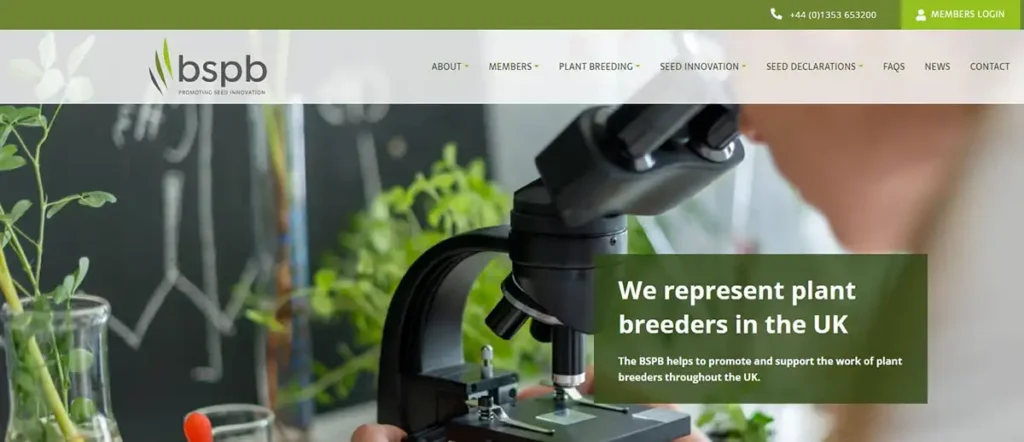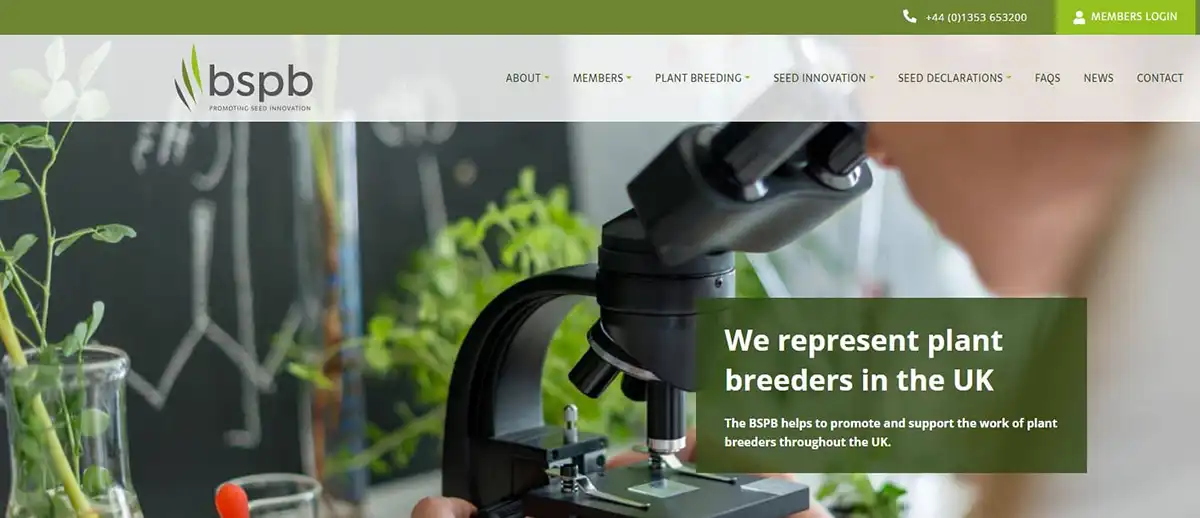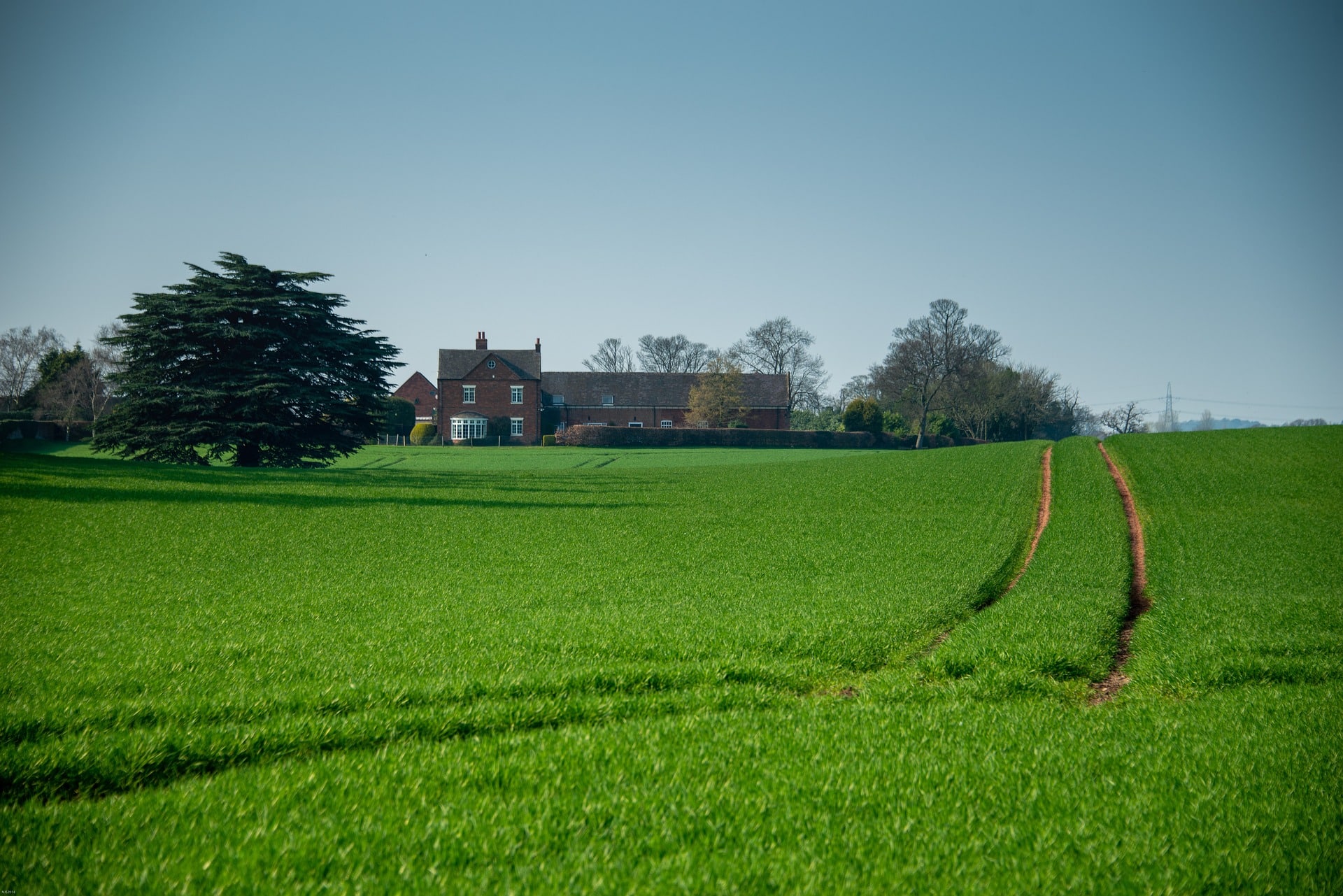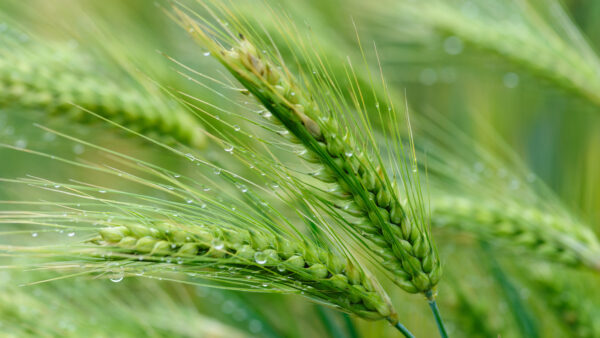Whilst 2020 brought great uncertainty and provided few answers, 2021 has offered the opportunity for a renaissance. The British Society of Plant Breeders (BSPB) has outlined plans for a new brand identity and website for the organization. This, along with a new platform for making seed declarations, will improve the position of the BSPB with its members, farmers, and the wider agricultural community.
BSPB has been working closely with The Department for Environment, Food and Rural Affairs (DEFRA) to stress the importance of separating gene editing from genetically modified organism (GMO) legislation. It is hoped that these efforts will be successful, offering BSPB the opportunity to work with DEFRA to bring greater legal certainty and clarity to plant breeders.
BSPB continues to work closely with members to support innovation and encourage development. From supporting sugar beet breeders in streamlining the National List process, to finding new ways of protecting innovative traits, UK breeders are developing.

The unfolding impact of Brexit is only starting to be understood and BSPB is already adjusting to changes the deal has brought. BSPB is committed to supporting members through the Brexit transition and, if necessary, will lobby to make sure changes in legislation do not restrict investment in UK plant breeding or the genetic diversity that it creates.
2021 is already showing that we are reaching the light at the end of, what has felt like, a very long tunnel. Brexit, COVID-19, and the impact of climate change have dominated the somewhat gloomy headlines for too long. 2021 has a more optimistic outlook that we hope will settle the turbulent times we have faced and offer an opportunity to focus on prosperity in the future.
A Fresh Look
BSPB has chosen to breathe new life into the visual identity of the organization. A refreshed logo and website have been developed and will launch in the summer of 2021. The aim is to help members and farmers recognize the importance of plant breeding and to better educate the agricultural industry on how plant breeders are working to help feed the growing population.
[tweetshare tweet=”BSPB has chosen to breathe new life into the visual identity of the organization, with a refreshed logo and website and the aim to help members and farmers recognize the importance of plant breeding” username=”cf7f77f3fe8019639b54cda82dcf9d6d”]
The new website has been designed to offer more information in one place. The previous microsites that were offered to cover the various facets of the industry have been brought together to demonstrate the strength and depth of the plant breeding sector. This will help users find more information more quickly and enable farmers and growers to access a new payment portal.
Farm payments have been improved by a new payment portal that is easier to access and easier to use. All declarations of farmed saved seed can be made using the online portal, making it easier than ever to declare what farm saved seed has been used.
To extend the new brand image, the BSPB member and farmer newsletters will also have a new design. Plant Breeding Matters is a quarterly publication that informs the membership on industry news and offers insight from BSPB staff and affiliates. It will be joined by a new biannual newsletter, Promoting Seed Innovation, which will help promote the efforts of plant breeders and explain the value of their work to farmers. BSPB is dedicated to protecting the intellectual property of its members. The new identity will help to relaunch an ongoing campaign to secure the royalties from farmers that are vital to the industry.

The ‘B’ Word
Not Boris but Brexit, although to some the two have become synonymous over the last few years. The UK exited the European Union in January and three years of discussions were drawn to a close. However, it is just the beginning for the many industries that rely on pan-European trade.
Following the UK’s exit from the Europe Union, several challenges have arisen which are currently putting pressure on the continued success of the UK’s breeding industry and supply of seed.
New Sanitary and Phytosanitary (SPS) requirements on seed coming from EU Member States or being exported into EU member states from the UK for experimental, trial, research and breeding purposes is adding cost and time. This has led to concern that the number of varieties being tested in the UK could reduce, which could also reduce choice for UK growers and lead to a decline in the genetic diversity of varieties. However, BSPB is working closely with DEFRA and the devolved administrations to reduce and streamline this process. Changes have already been made by DEFRA to how seed for final use, such as trials, is tested and sampled as it comes into the UK, which should help the process.
The methods and regulations involved in exporting seed to EU member nations have become less clear, and although we have equivalence on certified seed with the EU there is very little alignment on requirements between countries. BSPB is therefore working with DEFRA, the EU Commission and individual member states to clarify the requirements for importing seed. The aim is to collate a list of issues relevant to specific Member States that can be addressed and hopefully overcome. Seed and plant breeding is very much a European industry, and we want this to continue.
[tweetshare tweet=”With Brexit, the methods and regulations involved in exporting seed to EU member nations have become less clear, and there is very little alignment on requirements between countries.” username=”cf7f77f3fe8019639b54cda82dcf9d6d”]
Importing seed into the UK also carries challenges. The EU chose an immediate start date of 1 January 2021 for SPS requirements. However, the UK opted for a phased entry, starting with higher priority plants. Although this is a welcomed phasing of new checks and procedures it has led to some confusion at UK borders. Working with DEFRA, BSPB has tried to provide increased communication to members importing seed, hoping to ensure seed supply remains consistent and secure now and in the future.
Duties on seed imports and exports between the UK and EU Member States has been causing confusion and uncertainty. This has caused some delays at border control, and, in some cases, it has increased the cost for businesses importing seed. BSPB is communicating with businesses and individuals handling the import of goods into the UK about when a duty is due. Clarifying this will help to ensure products are not being held up awaiting a decision. It will also help to prevent against any unnecessary payments being made.
As a founding member of the Agri Supply Coalition, BSPB has been able to feedback to its members, information and advice on government initiatives that can support businesses effected by Brexit. The strength of being in an industry coalition has proved vital during this time, and we have valued the relationship and ability to share concerns and ideas, even more so as a result of the restrictions imposed by the pandemic.
Edited or Modified?
In March, DEFRA put forward a public consultation to gather opinion on the debate about whether gene editing (GE) should be regulated in the same way as genetically modified organisms (GMOs). BSPB welcomed this consultation and hopes that the results to the questions it has posed will reflect positively on the fundamental differences between GE and GMOs.
The results will be published later this summer and DEFRA has received 6444 submissions which highlights the importance of GE and this legislation to food and farming in the UK. BSPB supports new breeding techniques such as gene editing as these new technologies help us accelerate and improve changes that occur naturally over time. GE has the potential to make producing abundant, healthy food part of reducing the environmental impact of a growing global population. By improving the natural breeding process, GE can help the UK to reach climate and biodiversity goals. It could also have the potential to produce pest and disease resistant crop varieties that can adjust to future climate changes.
[tweetshare tweet=”BSPB supports new breeding techniques, such as gene editing, as these new technologies help us accelerate and improve changes that occur naturally over time” username=”cf7f77f3fe8019639b54cda82dcf9d6d”]
This was supported and shared in the recently published EU Commission study on New Breeding Techniques. The study highlighted that the current legislation for these technologies is not fit for purpose and suggested that GE has the potential to support the EU’s farm to folk and biodiversity strategies.
BSPB is hopeful that the distinction between GE and GMOs will be clearly identified and that this will lead to restrictions being lifted. Should this happen, it will offer a huge boost to members and represent a significant change in policy that BSPB believes will only help UK farming and food production.
Step Forward Steffen
BSPB and its members were excited to hear the thoughts and findings of a new report that has the potential to help champion plant breeding throughout Europe. Steffen Noleppa published the report that illustrates the socio-economic and environmental value of plant breeding to farming and food production. It discusses how plant breeding has enabled the EU to produce crops more efficiently and highlights the yield benefits in certain member states.
The research considers the impact that plant breeding has had on crop production since the turn of the millennium and offers some very encouraging conclusions and data. Noleppa states that “on average and across all major arable crops cultivated in the EU plant breeding contributes approximately 67 per cent to innovation induced yield growth.” It goes on to confirm that this is “equal to an increase of yields by 1.16 per cent per annum”.
The report claims that plant breeding has directly led to an increase in the yield of arable crops in Europe and that on average production would have been more than 20 per cent lower in 2020 without the genetic crop improvements that have been implanted since the beginning of the millennium. More specifically it identifies increases of 53 million tons of cereals and 8 million tons of oilseeds that have been produced because of modern plant breeding methods.
This growth has reduced the need for the EU to import wheat and other cereals which has improved world food security by making more food available. Arable farming has benefited with almost 90,000 jobs being created and plant breeding has also contributed to agricultural salaries increasing.
Noleppa states that less national habitat has been converted to food production because plant breeding has advanced the efficiencies of arable crop production. This has saved 21.5 million hectares of land from cultivation. Further environmental benefits include reductions in GHG emissions with a total of 4 billion tons of direct CO2 emission being avoided by genetic crop improvements in major arable crops in Europe in the past two decades.
[tweetshare tweet=”The Noleppa study made everyone aware the efforts of plant breeders must be recognised and promoted to help the sustainability of agriculture in the future.” username=”cf7f77f3fe8019639b54cda82dcf9d6d”]
Noleppa’s work has demonstrated to us all the ever-growing importance of plant breeding to crop production efficiency and environmental responsibility. Most of all it has excited the industry and made everyone aware the efforts of plant breeders must be recognised and promoted to help the sustainability of agriculture in the future.
Re-evaluating PRM
BSPB has welcomed the European Commission study on plant reproductive material (PRM). The review, which updates a previous study carried out in 2007-2008, confirms that whilst many aspects of PRM have remained consistent, the technical developments in seed production and plant breeding should be modernised to reflect the developments in the sector.
The study suggests that by allowing the industry to streamline decision making procedures it can become more efficient. It goes on to say that it could be possible to increase the number of tasks that operators may carry out under supervision of the competent authorities when the risk so allows. This represents a step forward for BSPB members and the industry as a whole and will enable a more productive and efficient process to emerge from the findings in the study.
BSPB is therefore looking forward to digesting the recently published impact statement with the goal of keeping the UK aligned with the EU on seed related issues to secure the smooth supply of seed between nations.
Moving Ahead
I have been in post for a year, and it has been a roller-coaster of a ride. We have all made such significant adjustments to our work, social and family lives to cope with the changes COVID-19 has brought. BSPB is privileged to have such a dedicated team and a helpful membership, and I am grateful to them all.
The pandemic has drawn attention to agriculture’s ongoing challenge to feed our population. This, we hope, will lead to a greater appreciation for the work our members and the wider agricultural community does to help.
As things return to normal, I welcome the opportunity to face industry challenges and I look forward to discussions with many of you in the near future.
Editors Note: Sam Brooke is Chief Executive at The British Society of Plant Breeders Ltd (BSPB).
Related Articles:
Sam Brooke named as new BSPB Chief Executive













